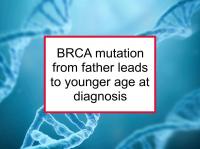A new study presented at the annual American Society of Clinical Oncology (ASCO) Meeting has reported that women who inherit BRCA mutations from their fathers tend to develop breast and ovarian cancer at a younger age than women who inherit such genetic defects from their mothers.
Proteins made by breast cancer susceptibility gene-1 (BRCA1) and breast cancer susceptibility gene-2 (BRCA2) are used to repair damaged DNA. Defects in this process cause mutation carriers to have relatively high lifetime risks of developing breast, ovarian and some other cancers. To conduct the study, the authors analyzed data concerning 1,351 consecutive patients presenting for genetic counseling between 2004 and 2010. Which parent passed on the defect was known in 148 women with BRCA 1 or BRCA 2 mutations.
Sixty-three of the 148 women inherited their BRCA mutations (BRCA 1 or BRCA2) from their fathers, 83 inherited from their mothers, and two women inherited both BRCA1 and BRCA2 mutations from their fathers. No ovarian cancers were found among women who inherited BRCA 2 mutations from their mothers. Women who inherited a BRCA2 mutation from their fathers had an earlier average age of diagnosis of breast and ovarian cancer than women who inherited from their mothers. A similar trend was found for BRCA1 mutations, but it was not statistically significant.
The authors conclude that women with paternally inherited BRCA gene mutations tend to have cancers diagnosed at earlier ages compared with women who inherit BRCA gene mutations from their mothers. These findings have important implications for surgical risk reduction strategies if the results are duplicated in larger populations.
Please see our article on breast cancer diet for BRCA mutation carriers for more information.
